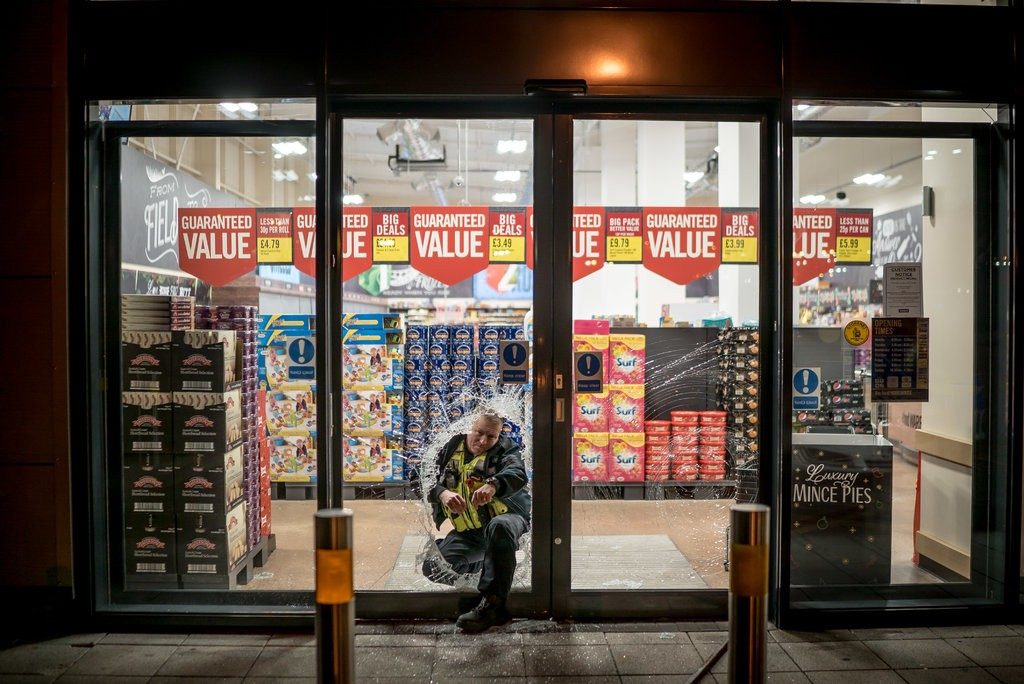Fewer Officers, More Calls: U.K. Police Are Stretched by Austerity

On a foggy afternoon last fall, a suicidal patient walked out of Solihull Hospital and disappeared. Alerted by hospital staff, police officers discovered her on a Birmingham street, having downed a bottle of vodka.
They took her to their station house, waited for her to sober up and called social service agencies and charities for help. Their calls were rebuffed or never answered.
At midnight, Constable Richard Chant finally persuaded the woman to go to a different hospital, but it was a Pyrrhic victory. In the eight hours that officers worked on her case, the West Midlands Police Department received 1,452 other emergency calls, and in many of those cases, hours or days went by before an officer responded.
“It was a bit of checkmate,” Constable Chant said. “We need to support these people in crisis, but the police are not the right ones to be dealing with them.”
Constable Chant’s burden reflects the strained state of policing in Britain’s era of economic austerity: The number and range of emergency calls has risen sharply in Birmingham and in many other cities, but there are now far fewer officers to respond. The economic uncertainties around Britain’s withdrawal from the European Union mean that budget pressures could be far from over.
The West Midlands Police has seen $220 million in budget cuts since the Conservative-led government’s austerity program began in 2010. The department has slashed a quarter of its officers, leaving numbers nearly as low as when the force was formed in 1974. Across England and Wales, police staffing has fallen by about 20,000 officers.
The problem is compounded by parallel cuts to social services. Addiction services, housing benefits, gang mediation programs and social services for both adults and children have all been pared back, creating metastasizing problems that often fall to the police.
There are also questions about whether the cuts are contributing to a spike in violent crime. Murders and robberies, while not near American crime rates, have surged to their highest levels in a decade in England and Wales. Knife offenses rose in 2018 for the fourth straight year, and crimes involving firearms dipped after rising for several years.Inspector Lucy Bird, right, at the scene of a stabbing in Birmingham in November.CreditAndrew Testa for The New York Times

The Digbeth Police Station in Birmingham is now closed to the public under austerity measures.CreditAndrew Testa for The New York Times

The cuts have also put pressure on operators who handle emergency calls.CreditAndrew Testa for The New York Times

Since the mid-1990s, Britain has registered a marked decline in violent crime, national crime surveys show, and it is too soon to know if the recent uptick is an anomaly or a trend. But much of the recent debate has focused nonetheless on the impact of austerity — particularly on how crime calls are going unanswered as officers work to plug holes in the country’s safety net.
“If you’re putting your faith in the police to sort out these problems, you’re really firing a sort of pea shooter at something that’s a cannon-sized problem,” said Richard Garside, the director of the Center for Crime and Justice Studies in London.
Hours devoted to health and welfare calls leave less time to collect evidence and solve crimes. As a result, victims who are not in immediate danger routinely wait days for a police interview. Officers say they have essentially given up investigating property crimes, dropping burglary complaints unless the homeowners can find a fingerprint or provide surveillance video.
Police spending ballooned in the early 2000s under a Labour government, which gave officers a broad charge to clamp down on small-scale misbehavior and impose order in accordance with the “broken windows” theory of policing that was then much in vogue. No longer.
“It was all right, the police being the jack-of-all-trades, when there was a necessary amount of funding for the police,” Constable Chant said. “But if you’ve got 20,000 less police officers, less funding, then somebody needs to make the decision about what they want us to do.”
A Tattered Safety Net
Two hours north of London by train, the West Midlands contains former factory towns and cities that were once the industrial heart of England. It is now among the poorest regions in Britain.
Last summer, as the West Midlands Police confronted a backlog of more than 2,000 unanswered complaints, the department’s leader, Chief Constable Dave Thompson, went on patrol himself. One woman had filed a complaint about her brother slashing her tires but was more worried about his mental health than the vandalism.
“They’d tried the doctor and got nothing; they’d tried a community mental health team and they got nothing,” Chief Constable Thompson said. “I can’t solve this for them, but increasingly, we see calls coming through to the police like that because we’re here 24 hours a day.”
A man being taken into custody after being arrested by a police bicycle team in November.CreditAndrew Testa for The New York Times

The West Midlands, which includes Birmingham, was once Britain’s industrial heart. It is now one of the poorest regions in the country.CreditAndrew Testa for The New York Times

Social services have also been pared back under austerity, creating metastasizing problems that often fall to the police.CreditAndrew Testa for The New York Times

On a different afternoon, Inspector Lucy Bird fielded emergency calls in the West Midlands Police dispatch room, her radio crackling with what she called “mispers,” police slang for reports of missing people, many of them mentally ill.
One call involved a mentally ill woman who had stolen lighter. (New York Times)

